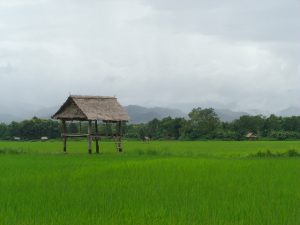Environmental benefits of organic improve over time
 photo credit: Poida.smith
photo credit: Poida.smith
A recent study published in the Journal of Cleaner Production used a life-cycle assessment to determine the environmental impact of organic rice production in China at 5, 10, and 15 years after conversion. Researchers assessed environmental factors including the amount of non-renewable energy used, the amount of water used, the amount of land needed, global warming potential, acidification potential, the potential to contribute to nutrient water pollution (responsible for the formation of dead zones), potential to release water pollution toxic to aquatic wildlife, human toxicity potential, and soil toxicity potential for humans. They found that overall, the conventional rice production system had 10 times more negative environmental impact than the organic rice systems, and that the negative environmental impact of organic rice systems decreased the longer they were in organic production.“Based on this study, organic rice systems have the potential of being recommended as sustainable agricultural practices in comparison with conventional practices. Furthermore, the present study indicated that the difference in the environmental profile of organic versus conventional agricultural products might be underestimated when analyzing organic systems that have not yet reached their steady state,” the researchers concluded.


